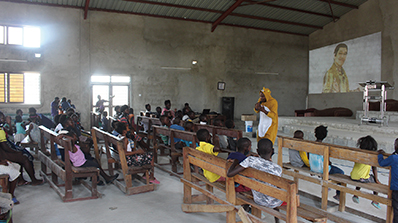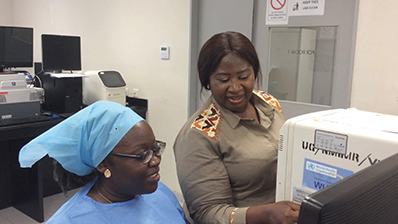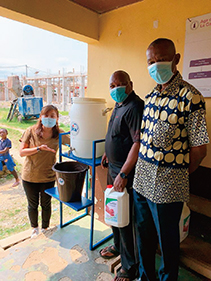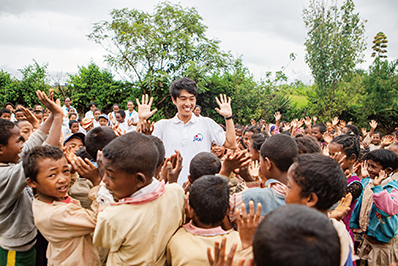(2) Economic and Financial Support, and Assistance for Building a Resilient Society and Improving its Environment
In light of the worsening global economic and social conditions and humanitarian situations caused by the COVID-19 pandemic, Japan has provided careful assistance tailored to the needs of each country in a wide range of fields, including water and sanitation, nutrition and food, education, and gender.
Among them, in the field of communications, which has become indispensable infrastructure amid the COVID-19 crisis, Japan works to support the spread of online education in developing countries, and actively utilizes Information and Communication Technology (ICT) Note 5 in ODA projects and promotes digital transformation (DX). Note 6 Furthermore, Japan supports sustainable development focused on environmental conservation by supporting the shift to renewable energy among other efforts, and actively utilizes private finance using ODA as a catalyst in the fields of climate change and the environment. Japan will continue to implement development cooperation toward the post-COVID-19 era in cooperation with various actors (see “Japan’s Efforts toward the Post-COVID-19 Era”).
A. Economic and Financial Support to Respond to the Crisis

A Zambian comedian teaching handwashing to children in a Lusaka compound (Chawama District) using PPAP2020 (Photo: Mr. HAYASHI Shunichiro, former JICA personnel)
In order to underpin economic and social activities in developing countries that have been severely affected by the global economic slowdown, as well as to address their financial needs including in the health and medical sectors, since the establishment of the COVID-19 Crisis Response Emergency Support Loan, Japan has provided ODA loans totaling ¥349.5 billion to 14 countries from July 2020 to the end of December 2021. In addition, in July 2021, Japan provided a financial assistance loan of up to $200 million through co-financing with the Inter-American Development Bank to support policy promotion for the Dominican Republic’s recovery from crises in health and hygiene, and the economy.
In regard to the Debt Service Suspension Initiative (DSSI)* agreed by the G20 and the Paris Club in 2020, Japan agreed on suspension of payments for 11 countries as of December 2021 and signed the Exchange of Notes. Regarding the Common Framework for Debt Treatments beyond the DSSI,* three countries, namely Chad, Ethiopia, and Zambia, have requested debt restructuring. Japan will work to ensure the debt sustainability of developing countries through participation in discussions towards concrete debt relief.
B. Support for Building Health and Medical System

Japan has provided support to the Noguchi Memorial Institute for Medical Research in Ghana through JICA for approximately 50 years. The photo shows an ex-JICA training participant (left) working at the Advanced Research Center for Infectious Diseases at the Noguchi Memorial Institute for Medical Research. (Photo: JICA)
Japan has supported building health and medical systems in developing countries for many years from perspectives such as developing capacity of healthcare workers, networking regional hospitals, and strengthening regional health systems. During the recent COVID-19 crisis as well, the medical facilities that Japan has supported are playing central roles for infection control measures (see “Japan’s Efforts toward the Post-COVID-19 Era” for support to Cho Ray Hospital in Viet Nam as well as infectious diseases measures at the ASEAN Centre for Public Health Emergencies and Emerging Diseases and in Gabon; “Stories from the Field 7” for the establishment of a hospital in Bangladesh; “Master Techniques from Japan to the World 1” for medical education support in Ecuador; and the “Project Introduction Columns” on Thailand, the Solomon Islands, and Zambia for Japan’s support in medical and health care sectors in Thailand, the Solomon Islands, and Zambia).
In July 2021, the Project for Strengthening Surveillance and Diagnostic Capacities for COVID-19 and Other Emerging Diseases in Panama was launched. The project aims to improve the capacity of inspection and analysis as well as to strengthen the Infectious Disease Surveillance Note 7 network of the Gorgas Memorial Institute for Health Studies in Panama as a research center that plays an important role in the Latin America and the Caribbean region.
C. Developing Environments Resilient to Infectious Diseases

A handwashing water tank provided to a health center in Gabon (Photo: JICA)

A Japan Overseas Cooperation Volunteer (JOCV) providing instruction on the importance of habitual handwashing by dance and song at a school in Madagascar (Photo: JICA)
As the global starving population is increasing due to the COVID-19 crisis, Japan also works on preventing infectious diseases through nutrition improvement. In 2021, Japan has provided food aid to 25 countries and regions facing critical situations due to the impact of COVID-19 as well as historic natural disasters such as droughts, floods, and heat waves.
In December 2021, Japan hosted the Tokyo N4G Summit 2021 to promote international efforts to improve nutrition in the world. The discussions at the Summit focused on health, food, resilience, accountability, and financing. Over 390 commitments to improve nutrition were submitted by 181 stakeholders including 66 governments, 26 private sectors, international organizations, civil societies, and academia. Nutrition-related financing totaling over $27 billion was announced. In addition, the Tokyo Compact on Global Nutrition for Growth was issued as an outcome document that indicated concreate direction for the international society to improve nutrition endorsed by 215 stakeholders (see “ODA Topics 3.” See also Part II (8) for initiatives related to food security and nutrition).
In addition, Japan contributes to the prevention of infectious diseases in over 15 countries by providing water purification chemicals, fuel for water trucks, personal protective equipment for water utility personnel, and plumbing materials, as well as encouraging handwashing and conducting awareness-raising activities. In addition to providing support for the supply of safe and secure water, handwashing facilities, soap, and other environmental improvements, JICA also implements initiatives such as the “Handwashing for Health and Life Campaign” to promote proper handwashing in developing countries.
- Note 5: ICT is an abbreviation for Information and Communications Technology. It is a technology that integrates computers and other information technology with digital communication technology, as represented by the Internet and mobile phones.
- Note 6: Making people’s lives more convenient and enriching them through the introduction of new information technologies, and generating new value by recreating existing business structures with the introduction of new digital technologies, etc.
- Note 7: Collecting and analyzing information on outbreaks of infectious disease patients on a sustained basis using a unified method, and feeding back the obtained information for prevention and countermeasures.
